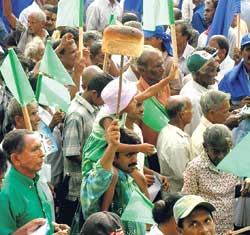
Opposition has its say while government has its wayWhile the government places its hopes on a military success to win over the support of the masses, the UNP banks on achieving this same objective through addressing the issue of the increased prices of bread and other essential items. To this end Government members speaking in Parliament last week addressed the hearts and minds of the populace hoping the 'feel good' factor initiated by military victories would keep the sentiments going. However, the UNP on the other hand hoped the ticket to the hearts of their voters would be through their 'bread price hike' hit stomachs. The government's emphasis on the military aspect was underscored by newly appointed MP Basil Rajapaksa, who turned his maiden speech in Parliament into a one hour, detailed account of the performance of President Mahinda Rajapaksa's administration since his election in November, 2005.
Armed with statistics ranging from how many new members were recruited to the Armed Forces and Police in the past two years (59,1400), to how many hits the government defence web site attracts per day (400,000), the number of threatened villages (566), and the amount spent per month to pay salaries to home guards protecting them (Rs. 400 million) - Mr. Rajapaksa made a convincing presentation to indicate the Government was doing its job. Though still a back bencher, Mr. Rajapaksa was privileged to have the undivided attention of a large number of government members including, Prime Minister Ratnasiri Wickremanayake, Leader of the House – Nimal Siripala De Silva and Chief Government Whip – Jeyaraj Fernandopulle despite his speech exceeding the lunch time. A very rare privilege indeed since on most days during the lunch/post lunch sessions all one sees are rows upon rows of empty seats while remaining members take an afternoon nap. Which is what probably prompted JVP Parliamentary group leader Wimal Weerawansa who spoke after Mr. Rajapaksa to state that if the presence of one member of the Rajapakse clan could invoke so much enthusiasm on the part of government members, a few more Rajapaksa's coming in may not be such a bad idea. The UNP of course shared a very different view about more members of the President's family entering Parliament and instead of the 'sahodara samagama,' main opposition party members were more concerned with the escalating price of bread. On Tuesday UNP MPs stood with posters depicting a loaf of bread priced at Rs 38 indicating the government's inability to control escalating flour prices was hitting the poor man's stomach. The bread/wheat flour issue then developed into the major topic of confrontation with allegations flying from one side to the other as to who was responsible for the present situation of the Prima company in a position to raise prices as it pleased and the government unable to intervene to impose controls. Present Trade Minister Bandula Gunawardena and two former trade ministers Rauff Hakeem and Ravi Karunanayake were all embroiled in finger pointing with Mr. Gunawardena saying they would seek a Parliamentary select committee to ascertain the truth behind the Prima deal. The findings of such a Committee are sure to be enlightening particularly given the fact that Minister Hakeem stated in legislature that "all governments have been slaves to Prima". UNP Kurunegala district MP – Dayasiri Jayasekera dragged the bread issue as far back as 1505 when the Portuguese arrived in the island and brought with them the much loved food item. He further added that bread had gone up in price from then till 2004 by only Rs 12 but within one year and nine months of the Rajapaksa administration it had gone up by Rs 18. Leaving alone the bread issue, the young UNP MP touched on more important issues, among those being the fast disillusion that was setting in among the public regarding politicians. "When we see the way politicians are depicted today it is sad. Politicians have become jokers," he lamented. Such sentiments coming from politicians, it seems it is not only the public but those in active politics themselves that are growing impatient with the system which seems to be rewarding wrong doers and sidelining those who genuinely want to make a change for the better irrespective of which party they represent. It was amidst the usual bickering that the government managed to push through the four finance bills that were stalled the last time due to protests from the UNP and the JVP. This time around the JVP chose to walk out in protest while the UNP stayed back. It was quite a come down for both the UNP and the JVP who had earlier vowed to defeat the bills but as politics goes, this is tantamount to passive support for imposing more taxes on the public.It's likely the opposition will continue to have only its say while the government will have its way as the budget month looms around the corner. |
|| Front
Page | News | Editorial | Columns | Sports | Plus | Financial
Times | International | Mirror | TV
Times | Funday
Times || |
| |
Reproduction of articles permitted when used without any alterations to contents and the source. |
© Copyright
2007 | Wijeya
Newspapers Ltd.Colombo. Sri Lanka. All Rights Reserved. |
